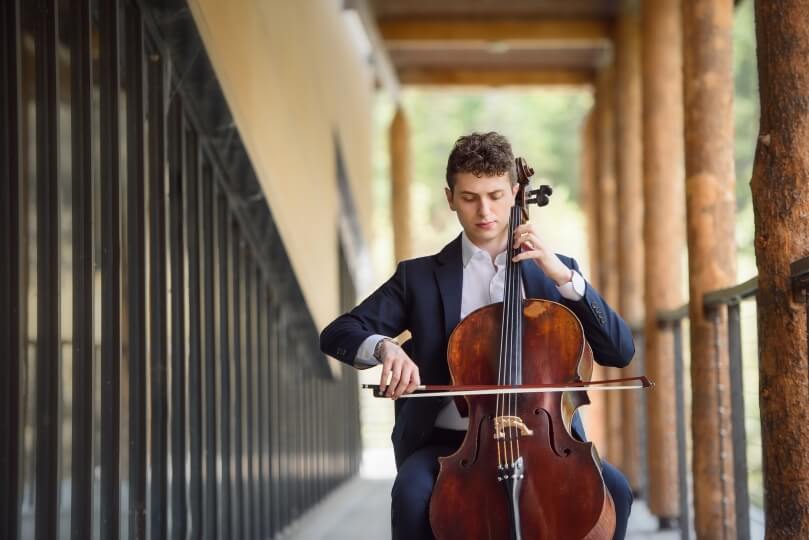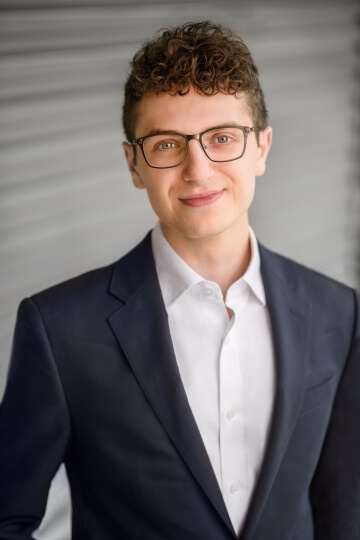Concert cellist Ethan Cobb, A.B. '22, is now pursuing a Master of Music degree at The Juilliard School. (Carlin Ma)
Ethan Cobb, A.B. '22 already had years of experience as a performing musician when he arrived at the Harvard John A. Paulson School of Engineering (SEAS). A cellist since he was 10 years old, Cobb attended The Juilliard School Pre-College program while attending Riverdale Country School in the Bronx, during which time he started becoming interested in the math and physics of sound.
Cobb continued studying both music and acoustics as an applied math concentrator at SEAS. He was Principal Cellist of the Harvard-Radcliffe Orchestra and a member of the Brattle Street Chamber Players and Chamber Music program, and played a key role in converting “ES25: Engineering the Acoustical World” from an offering primarily geared toward engineering students to a General Education course accessible to a wider range of Harvard students. He also undertook acoustics research projects in the Heller Group at the Department of Physics and Department of Chemistry and Chemical Biology, as well as in internships at NASA and Microsoft.
Cobb is now pursuing a Master of Music degree at Juilliard.
What drew you to Harvard?
My love for academics and especially mathematics, physics, and literature grew exponentially during my time at Riverdale. After visiting Harvard and having many conversations with Harvard students who played in the Harvard-Radcliffe Orchestra and played chamber music while also pursuing fascinating academic subjects, it became a dream of mine to attend.
When did you start playing cello?
My grandfather and great-grandfather were both pianists and my grandfather taught me piano starting from the age of 4. It wasn’t until I was 10 when my mother (a professional cellist) heard that my middle school was going to make everyone choose instruments to study the following year, so she started me on cello beforehand to make sure I’d choose cello.
At what point did you become interested in the science of acoustics and sound, and not just music performance? Did you come here planning to study applied math?
I first explored the intersection of music and mathematics for a senior project at Riverdale, which turned out to be a minimized version of what would eventually be my undergraduate thesis at Harvard. I had always been frustrated with the concept of intonation – the tuning of one note in relation to another – in music; I wanted to explore how one could get numerical, objective information about intonation. Learning about tuning systems and acoustics in general felt like discovering a gold mine, as it precisely blended the two disciplines I loved most – mathematics and music. Coming into Harvard as a freshman, I intended to study physics, but it soon became clear I needed more math. I loved the applied math coursework and felt that the concentration gave me precisely the flexibility I desired to take courses in multiple subjects, especially geared towards acoustics.
Did your applied math education cross over with your performance background or bring new insights to how the cello worked?
I took ES25 as a freshman, and for my final project I literally built a cello out of a wine box and attached cigar box. I had to do all the necessary engineering calculations to allow for proper tension of the four strings, length of the fingerboard, etc. The entire experience gave me so much newfound appreciation for instrument makers and luthiers. What I loved about my coursework at Harvard was that even though not every single concept could be applied to the cello, many ideas brought me new insights into physical actions on the cello.
The process of playing a string instrument is quite literally a physics equation.
Every single physical decision we make – the amount of bow speed, pressure, weight, vibrato, etc. – has a direct impact on the kind of sound we make as well as the quality.
Did your internship experiences at NASA and Microsoft utilize your knowledge of acoustic engineering in different ways from your education? Did that teach you something about applying acoustic engineering in industry?
Ethan Cobb, A.B. '22 (Carlin Ma)
My experience at NASA, which centered around the idea of modeling acoustic ray propagation in the atmosphere using differential geometry, exposed me to new fields of mathematics and physics that I initially had no experience in. The research actually utilized more mathematics and programming knowledge than acoustic engineering, but nonetheless my prior research and coursework experience proved to be quite useful. My research internship at Microsoft was within the Audio and Acoustics branch and focused on implementing real-time, physics-based acoustics simulation for video game and virtual reality software. My knowledge of acoustic ray propagation and acoustics from NASA and Harvard had to be combined with advanced numerical approximation and scientific computing techniques.
Was the plan always to go back to Juilliard for a master’s? What are you hoping to do with that graduate degree?
I ultimately felt that it was necessary to put myself in a conservatory environment in order to really give myself the opportunity to improve at the cello. Juilliard also has an exchange program with Columbia University, where I’ve continued taking graduate mathematics coursework. After I complete the Master of Music degree, I hope to either go into a field where I can utilize my applied math knowledge – possibly quantitative finance or data science – or maybe pursue more graduate study in applied mathematics while also continuing to perform with professional orchestras or chamber music opportunities as my schedule allows. I love music and math too much to not attempt to pursue both to some degree!
Lastly, looking back, was Harvard the right decision?
Without a doubt. Although every Harvard student can attest to the challenge of keeping up extracurriculars, social relationships, and other interests alongside the significant workload, we can all agree that it is precisely through that struggle where we learn most about ourselves and what we are capable of. The knowledge and connections I made, not to mention the amazing musical organizations that I got to be a part of, made my time at Harvard nothing but life-changing.
Press Contact
Matt Goisman | mgoisman@g.harvard.edu

